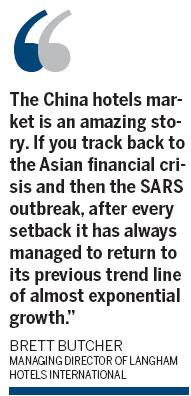
Brett Butcher, the 50-year-old Australian managing director of Langham Hotels International, said the wave of Chinese people flocking to the south resembles the way northern Europeans have been taking their holidays in Spain and the Canary Islands over the past 30 years.
More people fleeing to the south for holidays on sun-drenched beachesMACAO - Brett Butcher believes Chinese tourists escaping to the sun will revolutionize the leisure industry in Asia.
The 50-year-old Australian managing director of Langham Hotels International said ever wealthier people from the colder north of China will increasingly want to take their holidays in warmer climates.
He believes this will prove a boon to hotels on Hainan, the tropical island off China's southern coast, and to various other destinations in Southeast Asia.
"It is the next big growth story in China which has yet to happen. People are going to start to ask themselves in the winter: 'Why are we living in Beijing?'," he said.
Butcher predicts the wave of people fleeing to the south will be just as big a phenomenon as people in northern Europe taking their holidays in Spain and the Canary Islands over the past 30 years. He also believes the pattern will be similar to Americans wintering in Florida.
"We haven't scratched the surface of this yet. Sanya (on Hainan island) is already growing rapidly and there are a number of resorts there already," he said.
"If you go to Sanya beaches, they are better than Hawaii, pure white sand and crystal clear water.
"It is going to be phenomenal when it develops in a big way and change the whole way southern China works."
Langham, which is wholly owned by Hong Kong-listed Great Eagle Holdings in which the Lo real estate dynasty has a major stake, is planning to open a hotel in Sanya and believes its three luxury hotels in Hong Kong, which also benefits from a warmer climate, will receive a boost from this trend.
"It is going to affect Hong Kong and also Macao and we are going to have resort cities we have never even heard of today," he said.
Langham opened its first hotel on Regent Street in London in 1865, described as Europe's first ever Grand Hotel which also pioneered the use of hot and cold running water.
It currently has 11 properties and is to open a further 24 in the next three years.
In the Chinese mainland, it already has The Langham Yangtze Boutique Hotel and the Eaton Luxe, Nanqiao in Shanghai and plans to open four more in the mainland, including a Langham Place at Beijing Capital Airport Terminal 3, which is scheduled to be ready by August.
Butcher said the China hotels market is proving to be remarkably resilient after a very difficult year last year following the economic crisis.
"There has been a dramatic recovery this year. The China hotels market is an amazing story. If you track back to the Asian financial crisis and then the SARS outbreak, after every setback it has always managed to return to its previous trend line of almost exponential growth. It has the ability to just juggernaut its way through. It should be back on track again by 2011," he said.
"If you look at the United States now, it is going to take five, six or seven years to right itself following the financial crisis and get back to the trend line it was on before."

Butcher, who studied hospital management at Queensland University, began his career in restaurants before joining Sheraton, where he was involved in the opening of its Shanghai hotel in the mid-1980s.
He said the hotel industry in China was a completely different animal to what it is today.
"At that time China was not really on the radar. Then it was all about business travelers who were starting to form the manufacturing hubs in China and they were just looking for a decent place to stay," he said.
He said that since then China has been subject to a worldwide trend, which has seen the focus of the hotel industry switch to the leisure traveler.
"That has been the trend worldwide also over the past 25 years. Tourism has grown exponentially over that period," he said.
Butcher said the trend suits a five and four star hotel group such as Langham since the leisure traveler now demands the luxuries.
"Leisure guests are more demanding. They want the lifestyle product. They are happy to pay for suites," he said.
"The corporate sector no longer wants to pay for that. The business traveler just wants a hot shower, a cold beer and a place to do business. The corporates who used to pay the highest rates in a hotel now, in fact, pay the lowest."
Butcher, who went on to join Langham in 2002, says one of the dangers in China is the rush to build hotels for specific developments such as the Beijing Olympics.
"In the run up to the Olympics I was asked by journalists whether I was going to build a hotel in Beijing. I found it mind-boggling that anyone would ask that. You don't build a hotel for a two-week event. It is a 40-year deal," he said.
He said the five star market was often over-supplied in China with much "return on ego" rather than return on capital projects.
But he added: "Land can be very expensive in China and it is difficult to justify that price if you just build a two star hotel. The cost of the land as a proportion of the development is too high. A five star hotel is a longer play and it does take longer to establish itself," he said.
Butcher said the US market, where Langham has two properties - in Boston and in Huntingdon, Pasadena in Los Angeles - has been hit hard by the economic downturn.
"The US market unlike others is very dependent on conventions such as of dentists or whatever. There is an association for almost anything and it is this market that has been particularly badly affected," he said.
On the Chinese mainland and in Hong Kong, the main focus of Langham's business is mainland tourists, which Butcher believes will make up 90 percent of those staying in its mixture of four star and five star hotels. It aims to cater for them with hotel brands that either reflect European or contemporary style, rather than the East meets West feel of many of its competitors. Butcher believes this is what many Chinese people now want.
"Why do you see the mainland tourists lined up outside Louis Vuitton? It is because they want a sense of style from Europe. So we are clear our hotels are going to be well positioned. Whereas other hotel brands are heading down another track being very Asian influenced, colonial or whatever, we are something that is radically different. It gives us a great platform," he said.
Butcher said the group was trying to develop a new silk route, opening hotels throughout China, through Thailand, India and also the Middle East. The target in China is to have hotels in at least 15 cities, including Chengdu and Chongqing in western parts of the country.
"I think eventually half of our hotels will be based in China and we believe they will appeal very much to the Chinese market we are aiming at," he said.





